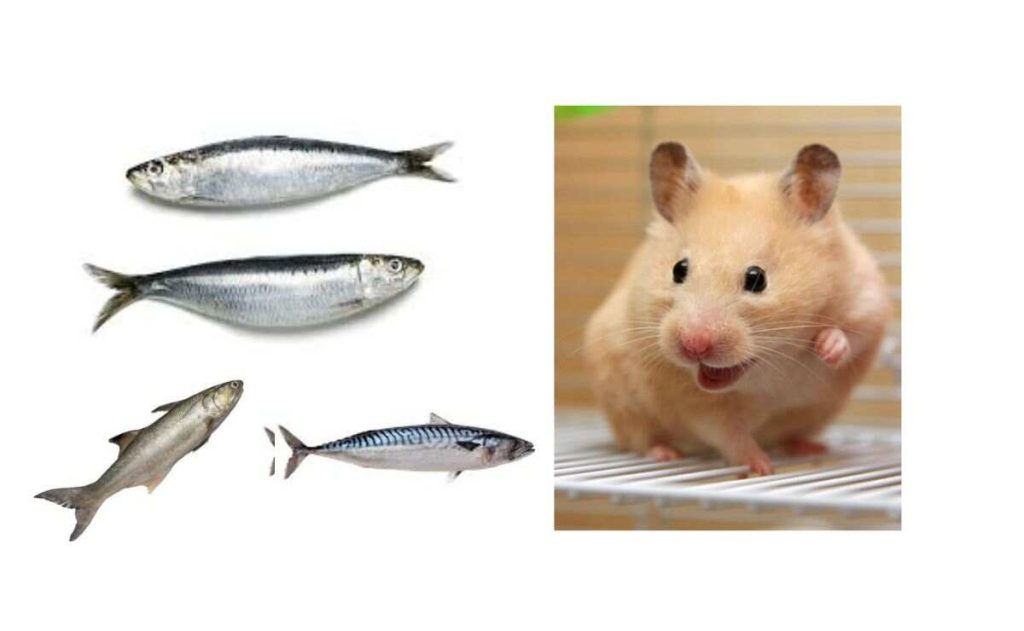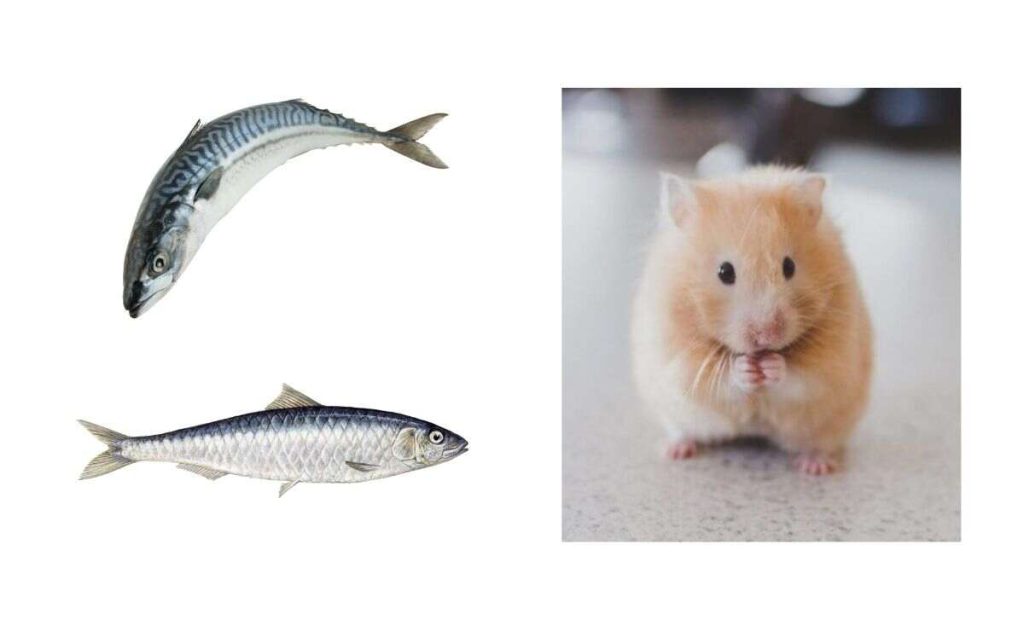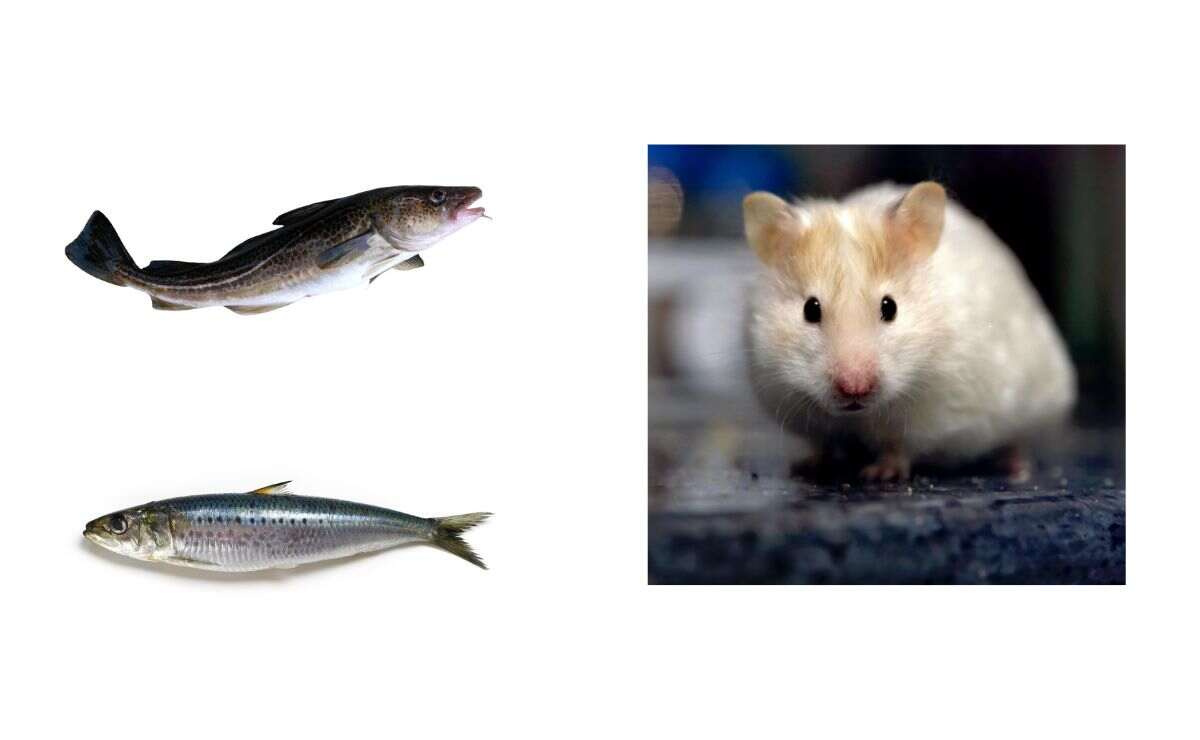Hamsters are omnivores, so they can eat both meat and plant-based foods. But can hamster eat fish? It’s a common question for most pet owners.
Certainly, hamsters can eat various kinds of fish. Still, fish should only be a small part of their diet. The bulk of their nutrition should come from high-quality hamster pellets. You can give them fish as a healthy treat. However, you need to be careful while giving fish if you want to be on the safe side. Read on to learn the proper way of feeding fish to your hamsters.
Can Hamsters Eat Fish?
Being omnivores, hamsters can digest the nutrition of fish. So yes, they can eat fish. Fish is a type of animal protein and also has other nutrients and minerals that are not available in vegetables. Hamsters require 16% protein and 5% fat to be healthy. So you can feed them with a small amount of fish to be healthy.
Fish is a nutritious addition to your hamster’s diet, but you should give it as an occasional treat, not a daily dish. Offering fish to your hamster once or twice a week strikes the right balance, preventing any potential digestive problems or health issues.
All types of fish options are not hamster-friendly. It’s crucial to avoid exotic or heavy fish varieties. They can cause issues in your hamster’s delicate digestive system. Stick to the small, light fish that are easy for hamsters to digest.
What Kinds Of Fish Can Hamsters Eat?

There are thousands of fish species globally, so it’s nearly impossible to brief them all. So we are explaining the most popular fish species for ease of understanding.
1. Tuna
You have to be cautious feeding tuna, mainly due to its high mercury content. Mercury can accumulate in tuna because they consume smaller fish. In humans, excessive mercury intake can lead to poisoning, and since hamsters are much smaller, this risk is even more significant for them.
If you want to feed your hamster tuna, opt for skipjack tuna, which has lower mercury levels compared to other types like albacore and yellowfin.
2. Salmon
Salmon is an excellent choice for hamsters. It’s rich in omega-3 fatty acids and healthy fats. It is one of the healthiest fish options. Unlike tuna, salmon is low in mercury, making it a safer choice for your hamster.
3. Shrimp
Although not a fish but a crustacean, shrimp is often considered in the same category of seafood. Hamsters can eat shrimp with no issues.
It’s a good source of iron, protein, magnesium, vitamin B, zinc, and omega-3s, all of which can benefit your hamster’s health. Shrimp is also low in mercury, eliminating the risk of mercury poisoning.
4. Cod
Cod is another fish that hamsters can consume safely. It contains ample vitamin D, healthy fats, and omega-3s. Similar to salmon, cod is low in mercury, making it a good choice for your hamster.
5. Sardines
Hamsters can eat sardines, provided they are fresh and properly cooked. Avoid canned sardines, as they are often preserved in oil or brine, which is not suitable for your pet. Fresh sardines can be a low-mercury source of various important nutrients.
6. Mackerel
Hamsters can eat mackerel, but it’s important to avoid king mackerel, which is large and high in mercury, similar to tuna. Opt for smaller varieties of mackerel to minimize the risk of mercury poisoning.
Can Hamsters Eat Dry Fish?
Your hamster can enjoy dried fish, such as Marukan dried sardines because they are rich in essential nutrients. They’re an excellent source of calcium and protein.
Offering these treats once or twice a week strikes the right balance, ensuring your hamster receives the essential nutrients without an excessive fish intake.
Can Hamsters Eat Canned Fish?
You shouldn’t feed canned fish to your hamster. Canned fish typically contains various additives, salt, and vegetable oil, which can be harmful to your pet. These ingredients can lead to health problems in hamsters. So you must avoid it.
Can Hamsters Eat Raw Fish?
Raw fish is also not recommended for hamsters. Because raw fish may contain harmful bacteria and parasites that can cause digestive problems to your pet.
Additionally, hamsters have delicate stomachs, and raw fish can be challenging to digest. Consuming raw fish poses a risk of various health issues and diseases for hamsters.
What Are The Health Benefits Of Feeding Fish To Hamsters?

In moderation, fish can be a great addition to your hamster’s meals. They will get many health benefits from it. For example:
Protein: Fish is packed with protein, which is vital for your hamster’s growth and development. This high-quality source of protein can boost your pet’s energy levels.
Vitamin D: It is a great source of vitamin D good to prevent rickets. It helps your hamster absorb dietary calcium and phosphorus. However, excessive vitamin D intake can lead to weight loss and diarrhea, so it’s important to provide the correct amount of fish.
Iodine: Fish contains iodine, which is essential for producing thyroid hormones in your hamster’s body. It not only supports your pet’s thyroid function but also helps prevent certain types of cancer.
Omega-3 Fatty Acids: The elements in fish are like superheroes for your hamster’s health. They can prevent skeletal muscle lesions, reduce inflammation, and help combat autoimmune diseases.
Mineral Rich: Fish is a valuable source of essential minerals like magnesium, zinc, and iron. These minerals are crucial for your hamster’s vitality, and deficiencies can make them lethargic and more susceptible to diseases.
What Are The Risks Of Feeding Fish To Your Hamsters?
Feeding fish to your hamsters can be beneficial but it also has some potential risks. Like
1. Bone Hazard: Fish bones can be sharp and pose a choking hazard to hamsters. If your hamster inadvertently ingests fish bones, it can become lodged in their throat or digestive tract.
2. Toxins: Certain types of fish can contain high levels of mercury and other harmful toxins. When consumed in large quantities, these substances can be detrimental to your hamster’s health.
3. Digestive Upset: Hamsters are not naturally accustomed to eating fish. Introducing fish into their diet too quickly or in excessive amounts can lead to digestive problems, such as diarrhea or vomiting.
4. Thiaminase Concern: Some raw fish contain thiaminase, an enzyme that can break down thiamine (vitamin B1) in the body. A deficiency in thiamine can result in severe health problems for hamsters.
5. Obesity and Nutritional Issues: Overconsumption of fish can lead to obesity in hamsters due to its high fat content, which is not suitable for their health. Additionally, fish doesn’t provide all the necessary nutrients your hamster needs.
6. Acidity Concerns: Excessive intake of omega-3 fatty acids, found in fish, can cause digestive issues and increase acidity levels in your hamster.
How Much Fish Can Hamsters Eat?
The amount of fish that hamsters can safely consume depends on their breed and size. Syrian hamsters are the largest among the hamster breeds and can tolerate the most fish in their diet. Approximately one teaspoon of fish every week should be sufficient to enjoy the benefits.
Robo hamsters are smaller than Syrian hamsters and you should give fish in moderation. It’s recommended to offer them a teaspoon of fish every other week to ensure their smaller bodies can handle it without issues.
Dwarf hamsters, including Winter White, Chinese, and Campbell hamsters, are notably tiny in size. Due to their small stature, it’s essential to be extra cautious with their fish consumption. Only a teaspoon of fish in a month is advisable for them. Their small bodies can’t handle a significant amount of fish, and this measured approach will help prevent any health problems.
How To Feed Fish To Your Hamster?
Fish can be an enjoyable treat for your hamster, but it’s important to follow certain precautions to ensure your pet’s well-being. So here are the right processes for feeding fish:
Firstly, cook the fish thoroughly to eliminate harmful parasites and bacteria that could be present. Raw or undercooked fish can pose health risks to your hamster. Ensure that the fish is well-cooked before offering it to your pet.
Never season the fish with ingredients like salt, pepper, garlic, or lemon. These seasonings are not suitable for your hamster and can be harmful to their health. Plain, unseasoned fish is the best choice for your pet.
Carefully remove any fish bones from the fish before feeding it to your hamster. They are sharp and pose a choking hazard. Before giving the fish, make sure it is bone-free that will help keep your pet safe.
While fish can be on the menu, there are certain foods that should never find their way into your hamster’s bowl. For instance, stay away from apple seeds, raw beans, raw potatoes, almonds, citrus fruits, garlic, onions, and rhubarb leaves or raw rhubarb. These items can be toxic or lead to digestive woes for your little pal.
Finally, fish should be an occasional treat for your hamster and not a substitute for their regular diet. This is especially important if you have a Dwarf or Robo hamster, as they are smaller and can’t handle large quantities of fish. Feed fish in small, appropriate portions to prevent overfeeding.
Conclusion
You can add fish to your hamster’s diet as a treat. But it can’t be an alternative to their major diet pallets.
You should offer fish in moderation and always cook it thoroughly. Always check the precautions of any fish you intend to give to your hamster.
Related Posts
